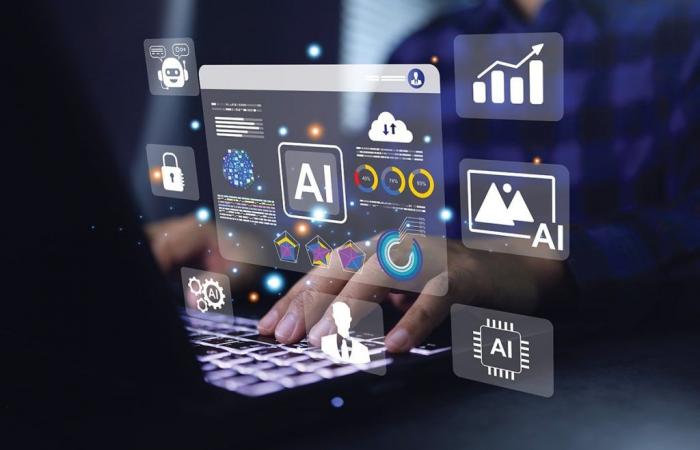To stay up to date, just like during the digital revolution, we must first understand how AI risks changing the business world.
Increasingly widespread use
According to the 2024 Ifop Barometer for Talan “The French and generative AI”, the adoption of generative artificial intelligence is becoming omnipresent in the professional world. Nearly half of users (48%) of these AI believe that their company encourages them in this use, and more and more of them share this information with their superior (36% currently compared to 25% in May 2023) . This trend thus demonstrates a consideration of the impact of generative AI within companies, on the part of executives and management, as they better understand its advantages.
An increase in productivity
It now seems widely accepted that generative artificial intelligence has a positive effect on increasing productivity and efficiency, with an average increase (38%). In addition, 46% of individuals aged 18 to 24 believe that this increase in productivity exceeds 40%.
However, three quarters of generative artificial intelligence users (75%) believe that these tools cannot automate more than 30% of their professional tasks. Among them, 46% even think that they could only automate less than 10% of their professional tasks. So how to use it?
Uses of AI
1/ Automation of repetitive tasks
AI can automate repetitive and time-consuming tasks, such as data entry, document classification, responding to basic customer queries, and more.
Example : In finance, many companies use AI algorithms to automatically extract relevant financial data from receipts and invoices. They thus reduce the time spent by employees performing this task manually.
2/ Advanced data analysis
This is because AI can analyze large amounts of structured and unstructured data to provide valuable insights to businesses. This can include predictive analytics, sentiment analysis, fraud detection, and more.
Example : Netflix uses AI to analyze its users’ viewing data and recommend personalized TV series and movies, which in turn improves user experience and drives engagement.
3/ Personalization of customer experiences
Using AI, businesses personalize customer experiences by recommending products or services tailored to individual customer needs. So, they can provide automated and real-time customer support, etc.
Example : Amazon uses machine learning algorithms to analyze customers’ purchasing histories and provide them with personalized product recommendations during their visits to the site.
4/ Optimization of business processes
AI can optimize business processes by identifying inefficiencies. Indeed, it can suggest improvements and automate decisions and actions to improve operational efficiency.
Example : In manufacturing, companies like Siemens are using AI systems to monitor machine performance in real time and predict potential failures, helping to optimize preventative maintenance and reduce unplanned downtime .
5/ Demand prediction and inventory management
Using machine learning techniques, AI can predict future demand for products or services. This helps businesses optimize their inventory levels and avoid shortages or surpluses.
Example : Walmart uses AI to analyze historical sales data, seasonal trends and external factors such as weather to predict demand for its products and effectively manage its inventory levels in its stores.
6/ Optimization of marketing campaigns
AI can optimize marketing campaigns by analyzing customer data. Indeed, it can identify target market segments, offer personalized messages and optimize distribution channels.
Example : Coca-Cola uses AI to analyze consumer demographics and behavioral data to personalize its advertising campaigns and effectively target the most receptive market segments.
7/ Automation of recruitment and human resources management processes
AI can automate recruiting processes by sorting resumes, conducting preliminary interviews, assessing candidate skills, and managing employee schedules and training.
Example : recruitment company HireVue uses AI algorithms to analyze candidates’ video responses and assess their cultural fit and skills, helping to optimize the candidate shortlisting process.
8/ Improved cybersecurity
AI can detect potential threats, identify abnormal behavior, and strengthen the security of IT systems in real time.
Example : Darktrace uses AI to monitor network traffic and detect suspicious activity, such as intrusion attempts or malicious behavior, allowing businesses to respond quickly and protect their sensitive data from cyber threats.
9/ Financial analysis and forecasts
AI can analyze financial data, identify trends and risks, and provide accurate forecasts to help businesses make informed financial decisions.
Example : JP Morgan uses AI algorithms to analyze financial market data, predict stock price movements and recommend investment strategies to traders, enabling them to make informed decisions and maximize their returns.
10/ Research and development
AI can be used to speed up the research and development process. Indeed, it can identify opportunities, generate innovative ideas, simulate scenarios and optimize design processes.
Example : Chemical manufacturer BASF uses AI algorithms to simulate and optimize the design of new materials, enabling it to accelerate the product development process and innovate more quickly in the market.
11/ Optimization of supply chains
AI can optimize supply chain management processes by predicting demand, optimizing delivery routes, reducing storage costs, and more.
Example : DHL uses AI algorithms to analyze historical order data, seasonal trends and weather conditions to forecast customer demand and optimize delivery routes to reduce transit times and logistics costs.
12/ Development of innovative products and services
AI can help businesses develop innovative new products and services. Indeed, it can analyze customer needs, identify market trends, propose creative ideas, etc.
Example : Automotive manufacturer Tesla uses AI to collect and analyze sensor data from its autonomous vehicles to continually improve their performance and develop innovative new features, such as fully autonomous driving.
13/ Sentiment analysis and online reputation management
AI can monitor social media and other online sources to analyze customer sentiments, manage company reputation, and respond to issues proactively.
Example : Airbnb uses AI algorithms to analyze user feedback and detect emerging trends, recurring concerns and potential issues, allowing it to intervene quickly to resolve issues and improve the overall user experience.
14/ Optimization of manufacturing operations
AI can optimize manufacturing operations. Indeed, it can identify bottlenecks, improve machine efficiency, reduce downtime, etc.
Example : General Electric uses AI systems to monitor the performance of its production equipment in real time, detect anomalies and predict potential failures, which allows it to optimize preventive maintenance, reduce non-stop downtime planned and improve the overall productivity of its factories.
15/ Development of dynamic pricing strategies
AI can help businesses implement dynamic pricing strategies by analyzing market data, customer behaviors, and other factors to adjust prices in real time.
Example : Uber uses AI algorithms to analyze demand for its ride-hailing services and dynamically adjust prices based on factors such as time of day, weather, local supply and demand, allowing it to maximize its revenues and optimize the use of its drivers.
16/ Risk analysis and insurance management
AI can assess risks, estimate claim probabilities, and help insurance companies set appropriate premiums based on customer profiles.
Example : Lemonade, an AI-powered insurance company, uses algorithms to analyze customer data and instantly determine insurance rates, reducing application processing times and improving the customer experience.
17/ Assistance in strategic decision-making
AI can provide advanced analytics, simulations, and scenarios to help executives make informed strategic decisions on growth, investments, mergers and acquisitions, and more.
Example : McKinsey uses AI systems to analyze market data, economic trends and business performance to advise executives on the best strategies for growth and expansion.
18/ Optimization of the employee experience
AI can improve employee experience by automating administrative tasks, providing personalized training programs, optimizing work schedules, and more.
Example : software company Workday uses AI to analyze employee data and recommend training programs tailored to their individual needs. This helps improve employee skills and productivity.
19/ Optimization of asset management
AI can monitor and manage a company’s physical and digital assets, optimizing their usage, maintenance and lifecycle.
Example : Shell uses IoT sensors and AI systems to monitor its oil and gas production equipment in real time, detect anomalies and plan preventive maintenance to minimize downtime and optimize production.
20/ Loss prevention and operational risk management
AI can identify potential risks of fraud, regulatory non-compliance, data security, etc., and implement preventive measures to reduce losses.
Example : HSBC (now CCF) used AI systems to analyze financial transactions and detect suspicious behavior that could indicate fraud or money laundering, allowing it to take preventative measures to protect its customers and assets against operational risks.






